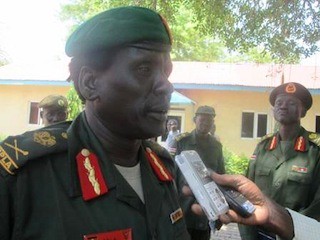
General Peter Gadet Yaak of South Sudan is said to be leading a mutiny from the SPLA in Bor, Jonglei state. Hundreds have been killed in the fighting., a photo by Pan-African News Wire File Photos on Flickr.
TUESDAY 18 FEBRUARY 2014
S. Sudan admits mass defection of its army to Machar’s rebels
February 17, 2014 (JUBA/ADDIS ABABA) – South Sudanese government on Monday revealed officially for the first time a situation of mass defection of its troops to rebels led by the former vice- president, Riek Machar, calling for more involvement of foreign forces to “fill the gap.”
In parliamentary session organised to discuss the current violence with the rebels that started in mid-December, senior security leaders and lawmakers made the rare admission, which they claimed had become a threat to the administration unless outside help was sought.
The government’s chief whip, Tulio Odongi, who controls members of the ruling party in the parliament, told the national legislature on Monday that up to 70% of the army was becoming loyal to Riek Machar and defecting to the rebels’ side.
He appealed to the foreign “allied forces” not to withdraw from South Sudan until the current “weakness” was addressed.
Odongi further urged the president to urgently acquire air, land and river defense weapons in order to face the looming threat posed by the rebels.
The minister of interior, Aleu Ayieny, while addressing the parliament, also shared the grave concerns raised by the chief whip.
He said the greater Upper Nile region, which constitutes the largest presence and deployment of South Sudan army, has recently been hard by defections to the rebels.
Aleu further revealed that even the police force was defecting to the rebels, adding that his own ministry was “terribly affected” because many officers had defected to the rebels.
The parliament approved a supplementary budget of 749 million South Sudanese pounds (over $300m) to deal with the security threats.
Minister of defence, Kuol Manyang Juuk, had earlier on revealed that his government was financing the Uganda army in order to join the war against the rebels.
The renewed government’s call for more interventions by foreign forces came days after the United Nations and many other countries including US, Ethiopia, Kenya and Sudan warned of “regionalization of the conflict” and called for the withdrawal of the Ugandan army and other allied foreign forces from the new country.
REBELS SAY MORE DEFECTIONS TO OCCUR
Meanwhile South Sudanese rebels have confirmed defections from the government’s forces to their side and further warned of more imminent defections in the coming period.
“Majority in the army have now come to realize the root cause of the senseless violence. They have learnt that Salva Kiir instigated the violence,” Machar’s spokesperson James Gatdet Dak, told Sudan Tribune on Monday, warning of more defections from the government in the coming period.
He said the army now sees President Salva Kiir as “a war-mongering commander-in-chief who could do anything to kill his own people indiscriminately, fitting ethnic groups against each other and bringing foreign forces to help him kill more people and destroy properties just in order to remain in power.”
Dak further criticised the revelation that Juba was paying Kampala for the military activities of Ugandan People’s Defense Forces (UPDF) in South Sudan.
“You can now see how his dictatorial administration uses the public money, not to provide the badly needed basic services for the benefit of the suffering people of South Sudan, but to buy Uganda army and other allied militias from Sudan to kill his own people,” he further alleged.
ARMY WARNS OR REBEL THREAT
The spokesperson for the South Sudan army, Philip Aguer, on Monday told reporters that the rebels were amassing their troops and closing in to recapture the strategic town of Malakal, which serves as the capital of the oil-rich state of Upper Nile.
“Today, forces of Riek Macahr are in Anagdiar, 15km from Malakal and our forces on the ground are saying the attacks are imminent,” he said, but said government’s troops were ready to repulse the rebels.
He, however, told the civilians to flee from the town if they wished so in order to escape from the imminent violence in the oil-rich city.
South Sudanese minister for petroleum, Stephen Dhieu Dau, also told reporters earlier that the rebels were too threatening to capture the oilfields, hundreds of kilometers east of Malakal.
But Machar spokesperson denied government’s version of the rebels advance, saying troops loyal to president Kiir were the ones attacking rebel positions around Malakal and that anti-government forces were pushing back the army in self-defense.
Dak further claimed that the government’s forces were also attacking their positions in Jonglei and Unity states.
He accused the government of continuous violations of the Cessation of Hostilities agreement signed on 23 January in Addis Ababa and said the rebels will be forced to fight back should the government continue dishonouring the agreements.
The two-month violence started between presidential guards in the new nation’s capital, Juba, and spread to the other three states.
Rebels say president Kiir who hails from the largest tribe, Dinka, instigated the violence when he attempted to disarm soldiers from Machar’s Nuer ethnic group in the presidential guards division in order to silent the opposition within the ruling (SPLM) party.
Kiir however said the violence was an attempted coup by Machar and his group of politicians in the party.
Talks have resume for the second time in the Ethiopian capital, Addis Ababa, to discuss the root causes of the conflict and resolve it.
(ST)
No comments:
Post a Comment